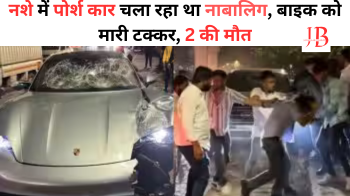A minor driving a Porsche while under the influence collided with a motorcycle, resulting in the deaths of two individuals.
In a tragic incident in Pune’s Kalyani Nagar on Sunday, two individuals lost their lives when a luxury Porsche Taycan, driven by 17-year-old Vedant Agarwal, son of the renowned builder Vishal Agarwal of Bramha Realty, collided with their motorcycle. The accident, which took place at around 3:15 am, involved Anish Awadiya and Ashwini Costa, who were returning home with friends on motorcycles after a night out at a local club. Vedant, who was reportedly driving the Porsche at an extremely high speed, rammed into their motorcycle at the Kalyani Nagar junction.
The force of the impact was so severe that it flung Awadiya and Costa into the air, and they landed on another car. Both victims died instantly. Following the collision, the Porsche crashed into the pavement and came to a halt. Local residents, who were awakened by the noise of the crash, rushed to the scene. They apprehended Vedant and, in a fit of rage, beat him up before handing him over to the police.

The Yerawada police registered a case against Vedant Agarwal under multiple sections of the Indian Penal Code, including 279 for rash driving, 304A for causing death by negligence, 337 for endangering human life, and 338 for causing grievous hurt. Additionally, charges under various provisions of the Motor Vehicles Act were also included.
In the aftermath of the incident, the Juvenile Justice Board (JJB) in Pune intervened and granted bail to Vedant. The board imposed several conditions on the young driver, reflecting the seriousness of the offense and the need for rehabilitation. According to advocate Prashant Patil, who represented Vedant, the bail conditions included mandatory service with the Yerawada traffic police for 15 days. During this period, Vedant is required to observe and assist the traffic police, gaining firsthand experience of the importance of road safety and the consequences of reckless driving.
Moreover, the JJB ordered Vedant to write an essay on the topic of accidents, presumably to encourage him to reflect deeply on the incident and its repercussions. This essay is intended to be a personal account of what happened, the impact on the victims and their families, and the broader implications of such accidents on society.
In addition to these measures, the JJB mandated that Vedant undergo treatment to address any potential issues with alcohol. This decision was made following suspicions that Vedant may have been under the influence of alcohol at the time of the accident. To confirm this, he was subjected to a medical examination, the results of which were still pending. As part of his rehabilitation, Vedant is required to receive counseling from a psychiatrist, focusing on both his drinking habits and the psychological impact of the accident. A detailed report of his progress and the outcomes of these sessions must be submitted to the authorities.
Eyewitnesses to the accident, such as Amen Sheikh, provided critical details about the event. Sheikh recounted that the Porsche was traveling at an alarming speed, estimated to be between 200-240 km/hour, which contributed significantly to the severity of the crash. Such high-speed driving in a city environment not only endangers the driver but also poses a significant threat to other road users, as tragically demonstrated in this incident.
The community response to the accident has been one of shock and outrage. Many residents of Kalyani Nagar and the surrounding areas expressed their grief and anger over the loss of two young lives due to reckless driving. There have been calls for stricter enforcement of traffic laws and more rigorous checks on underage and inexperienced drivers operating high-powered vehicles.
The families of Anish Awadiya and Ashwini Costa are left to mourn their untimely deaths. Friends and relatives have described both individuals as vibrant and full of life, making the tragedy even more poignant. The accident has served as a stark reminder of the fragility of life and the devastating consequences of irresponsible driving.
In the broader context, this incident has sparked a conversation about the responsibilities of parents in monitoring and controlling the behavior of their minor children, especially when it comes to the use of powerful vehicles. Questions are being raised about how Vedant, despite being underage, had access to a luxury sports car capable of such high speeds. The role of parental supervision and the need for more stringent regulations to prevent similar incidents in the future are being hotly debated.
As the legal proceedings continue, the case will likely influence future policies regarding juvenile drivers and the penalties associated with traffic violations leading to fatalities. The aim is to ensure that such a tragic event does not recur and that there is a greater emphasis on road safety education and the enforcement of traffic laws.

